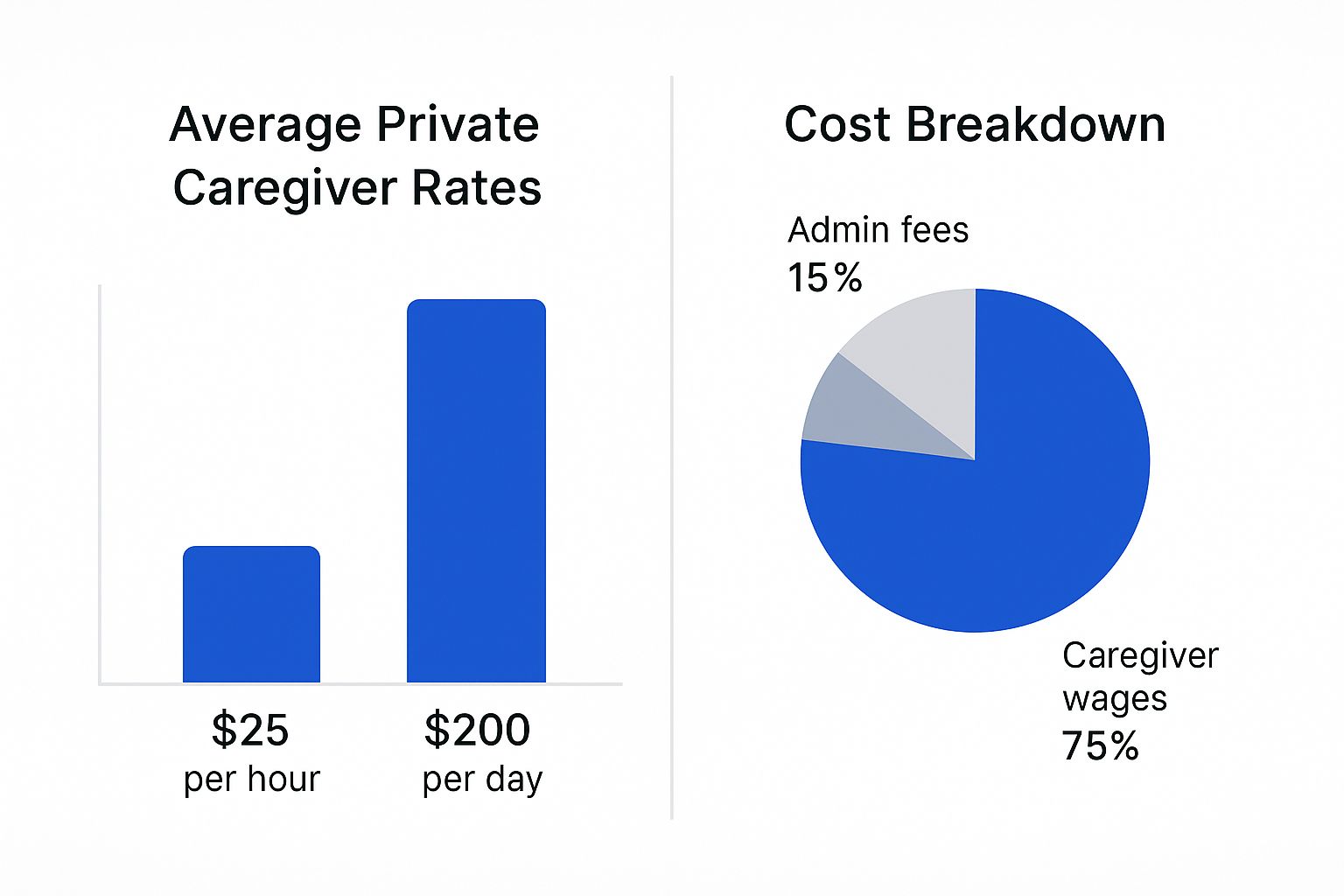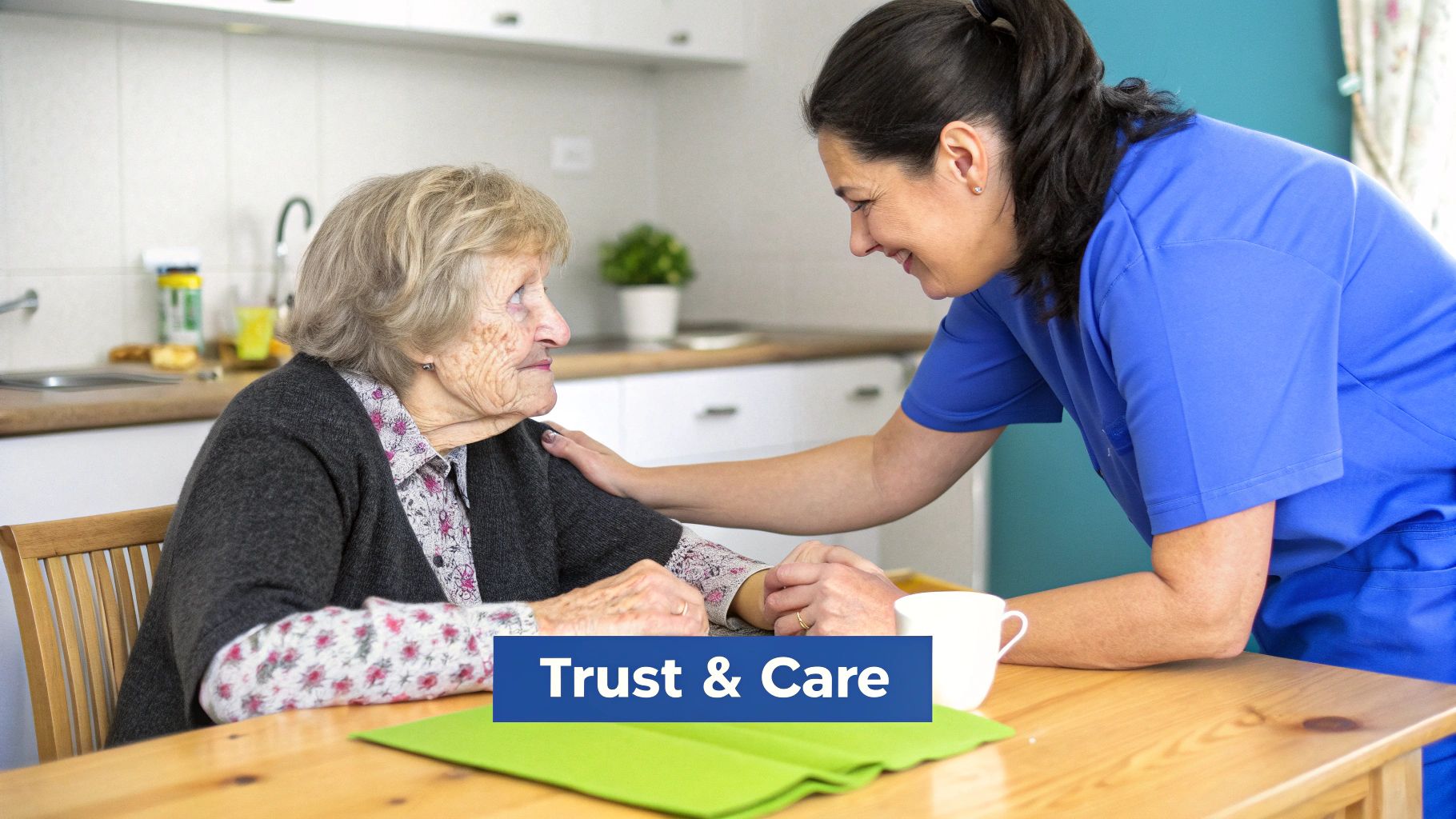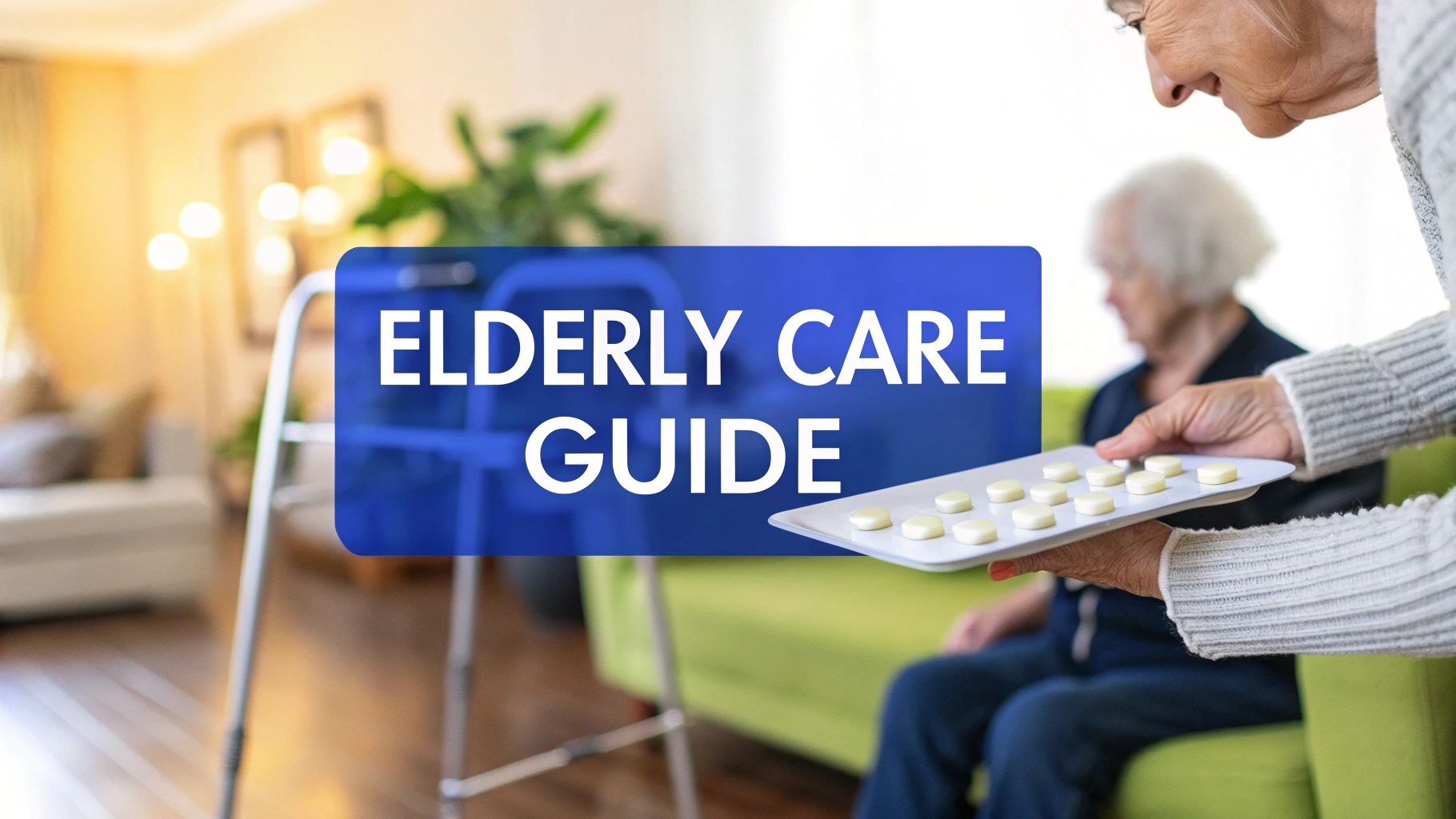When it comes to caring for an aging loved one, more and more families are looking for an approach that feels personal, dignified, and comfortable. They want their family members to age gracefully right where they feel most at ease: at home. This guide is your roadmap to understanding this shift and exploring why private caregivers for the elderly are becoming such a popular choice.
We'll walk you through everything, from what a private caregiver actually does to how you can hire one with confidence.
The Growing Preference for Personalized In-Home Care
The world of senior care is changing. For a long time, the default was moving into a facility, but today, the focus has shifted toward a model that puts comfort, independence, and familiarity first. For many seniors, aging in place isn't just a nice idea; it's essential for maintaining their quality of life.
Private caregivers are the heart and soul of this movement. They provide one-on-one support that’s built around a senior's specific needs, routines, and personality.
Unlike the rigid schedules of a nursing home, private in-home care is all about flexibility and a personal touch. This isn’t a small trend, either. It’s a massive shift, driven in part by a global demographic change some call the 'silver tsunami.'
The Impact of a Global Aging Population
Populations are aging all over the world, creating a huge demand for private caregivers. By 2060, it's projected that 30% of Europeans will be 65 or older. Here in the United States, seniors already make up about one in six Americans, and that number is set to climb significantly by 2050.
This growth is putting a real strain on traditional care facilities and shining a spotlight on the need for personalized solutions. You can explore more data on this global caregiver trend and what it means for families.
This new reality has turned private caregiving from a luxury into a vital part of our healthcare system. It allows seniors to get dedicated attention that supports their:
- Physical Health: With help for daily activities and reminders to take medication.
- Emotional Well-being: Through steady companionship that helps fight off loneliness.
- Personal Dignity: By empowering them to stay in the home they love.
The real value of private caregiving is its ability to adapt. It’s not about making a senior fit into a system; it’s about building a system of support that revolves completely around the senior.
Our goal with this guide is to replace any uncertainty you might have with clarity. We want to give you the knowledge you need to make the best possible decision for your family.
What a Private Caregiver Really Does Day to Day

It’s helpful to think of a private caregiver as a personal wellness concierge for your loved one. Their role is so much more than just basic assistance; they provide a flexible, one-on-one support system that adapts as a senior's needs evolve. This personalized attention is exactly what sets private caregivers for the elderly apart from the more rigid, one-size-fits-all approach of many care facilities.
Their responsibilities are broad, covering everything from the essentials of daily life to crucial emotional support. A caregiver's day is dynamic and is shaped entirely by the person they are there to help.
Core Responsibilities and Daily Activities
The duties of a private caregiver fall into a few key areas. While no two days are ever exactly alike, the ultimate goal is always the same: to make sure the senior is safe, comfortable, and enjoying the best possible quality of life at home.
A huge part of their role is helping with Activities of Daily Living (ADLs). These are the fundamental self-care tasks we all need to manage to live independently.
- Personal Care and Hygiene: This can include help with bathing, dressing, grooming, and using the restroom. A great caregiver handles these sensitive tasks with dignity and respect, always prioritizing the senior's comfort.
- Mobility Assistance: They are there to provide a steady arm when moving around the house, transferring from a bed to a chair, or getting outside for a walk. This support helps maintain strength and significantly reduces the risk of falls.
- Meal Preparation: From planning nutritious menus to cooking and cleaning up, a caregiver ensures your loved one gets healthy, delicious food that meets any specific dietary requirements.
Beyond these hands-on tasks, a caregiver also manages many of the household and logistical duties that can become overwhelming for an older adult. This often includes light housekeeping, doing laundry, and running errands like grocery shopping or picking up prescriptions. They can also provide transportation to doctor's appointments and social events, helping the senior stay connected to their community.
A private caregiver doesn’t just work through a checklist. They build a routine around the person, not the other way around. This adaptability is the true foundation of high-quality, person-centered care.
The Power of Companionship
Perhaps one of the most vital—yet often overlooked—duties of a private caregiver is simply providing companionship. Social isolation is a serious health risk for seniors, and it's been linked to both mental and physical decline. A caregiver becomes a trusted friend and a familiar face.
They engage in meaningful activities, whether it's having a good conversation, playing a card game, reading aloud, or just watching a favorite movie together. This consistent social interaction can dramatically boost mood, improve cognitive function, and enhance overall well-being.
By preventing loneliness, a caregiver supports not just the physical health of an elderly individual, but their emotional and mental resilience, too. This holistic approach makes all the difference in the world.
Comparing Your Senior Care Options
Figuring out the world of senior care can feel like trying to read a map with no legend. You’ve got options ranging from in-home support all the way to full-time residential facilities, and it’s easy to get overwhelmed. The real key is to understand how each choice fits with your loved one’s specific needs, their personality, and how much independence they want to maintain.
Choosing between a private caregiver, assisted living, and a nursing home isn’t about which one is "best"—it's about which one is the best fit for your family's situation. Think of it like buying a car. Someone hauling lumber needs a pickup truck, while a city commuter might just need a small, efficient car. Each one does its job exceptionally well for the right person.
For a senior who truly treasures their independence and the simple comfort of their own home but needs a hand with daily tasks, a private caregiver is often the perfect answer. It’s a personalized, one-on-one relationship focused entirely on their well-being.
Senior Care Options At a Glance
So, how do you even begin to compare? Let’s break down the main differences between the three big options in senior care. Getting a handle on how they differ in terms of environment, level of support, and social life will make it much clearer which path is right for you.
To get a sense of how the costs break down for private care, this visual gives a helpful overview of where the money typically goes.

As you can see, the vast majority of the cost goes directly to the caregiver's wages. This means you’re paying for quality, hands-on care, not just administrative overhead.
Making an Informed Decision
To help you see everything side-by-side, we’ve put together a simple table that highlights the core features of each care model. Look at how they stack up on personalization, independence, and cost to see what aligns best with your family’s priorities.
Senior Care Options At a Glance
Here is a side-by-side comparison of private caregiving, assisted living, and nursing homes across key factors to help you decide.
| Feature | Private Caregiver | Assisted Living | Nursing Home |
|---|---|---|---|
| Personalization | High (Dedicated 1-on-1 care) | Moderate (Group setting with some personalization) | Low (Standardized medical protocols) |
| Independence | High (Stays at home) | Moderate (Own apartment, but a structured schedule) | Low (Full-time residential medical care) |
| Social Setting | Individualized (Companionship, family visits on their terms) | Community-Based (Group activities and dining) | Clinical Environment (Focus on medical needs) |
| Cost Structure | Flexible (Billed hourly or live-in rates) | Fixed Monthly Fee (Often all-inclusive) | Highest Cost (Per-diem medical rate) |
This comparison shows a clear pattern: as the level of medical need goes up, the environment naturally becomes more structured and less personalized.
For seniors who can live safely at home with just a bit of help, private elderly caregiving offers that perfect balance of professional support and personal freedom. It empowers them to keep their routines, their social connections, and their sense of self in the one place they know and love best—home.
Your Step-by-Step Guide to Hiring a Caregiver

Hiring a private caregiver is one of the most personal and important decisions you can make for your family. It's a process that demands thoughtfulness and a clear plan to find someone who's the right fit. When you break it down into simple, manageable steps, you can move forward with confidence, knowing you'll find a caregiver who is not just skilled, but a true, compassionate companion for your loved one.
And you're not alone in this journey. The preference for personalized in-home care is growing fast. The global home care market was valued at around $250 billion in 2023 and is expected to climb to $383 billion by 2028. This boom shows just how many families are choosing this path. You can learn more about the growing demand for home care services and what it means for families like yours.
Step 1: Define Your Exact Care Needs
Before you even think about posting a job opening, you need to know exactly what you’re looking for. Think of it as creating a blueprint for the perfect caregiver. A detailed care plan not only steers your search but also sets crystal-clear expectations from the very first day.
Start by making a list of every single task required. The more specific, the better:
- Personal Care: Does your loved one need help with bathing, getting dressed, grooming, or using the restroom?
- Medical Support: Will the caregiver need to manage medication reminders, track appointments, or monitor specific health conditions?
- Household Duties: Think about meal prep, light housekeeping, laundry, and running errands like grocery shopping.
- Companionship: Is it important for the caregiver to engage in hobbies, conversation, or accompany your loved one on outings?
- Mobility: Is assistance needed to move around the house, transfer from a bed to a chair, or go for walks?
With this list in hand, you can build a clear and powerful job description. This document will become your best tool for attracting qualified people who truly understand the role. If you need a little help, you can also review our helpful caregiver matching resources to see how professionals assess these needs.
Step 2: Find and Screen Candidates
Now that you have your job description, it's time to start the search. Cast a wide net to build a solid pool of potential private caregivers for the elderly. A great place to start is by asking for recommendations from friends, local community centers, or healthcare providers you trust.
As applications begin to arrive, it's time to screen. A quick phone interview is a fantastic way to get an initial feel for a candidate's experience, their availability, and whether their personality seems like a good match. This simple step helps you trim down your list to the most promising people before scheduling face-to-face interviews.
Step 3: Conduct Thorough Interviews
The in-person interview is where you get to see beyond the resume. This is your chance to really gauge both their professional skills and their sense of compassion. Move past the standard questions and ask open-ended, scenario-based questions to see how they think on their feet.
The best caregivers possess a unique blend of technical skill and genuine empathy. Your interview process should be designed to uncover both qualities, ensuring they can handle the duties of the job while also forming a positive, trusting relationship.
Get a list of questions ready that dig into their caregiving philosophy:
- Can you tell me about a time you handled a difficult or uncooperative client?
- What do you find most rewarding about working with seniors?
- Describe a situation where you had to respond to a minor emergency. What did you do?
Step 4: Complete Background and Reference Checks
This is the final, crucial step—and one you should never, ever skip. Diligent checks are essential for the safety and security of your loved one. Always ask for professional references and make sure to call them.
A comprehensive background check is absolutely non-negotiable. This should include verifying their past employment, running a criminal record check, and confirming any licenses or certifications they’ve listed. Taking these final precautions gives you the peace of mind that you've found a truly trustworthy and reliable caregiver.
Understanding the Costs of Private In-Home Care
When families start looking into private caregivers for elderly loved ones, the financial side of things can feel like a huge question mark. But breaking down the costs is often more straightforward than you’d expect.
Unlike the flat, all-inclusive monthly fees you see with nursing homes or assisted living, private in-home care is built around your specific needs. This flexibility is one of its biggest advantages. You only pay for the services and hours you actually need, which can make it a much more sensible and affordable choice, especially if round-the-clock medical oversight isn’t required.
Key Factors That Influence Cost
So, what goes into the final price? A few key variables determine the cost, making sure the rate lines up with the level of support and skill your loved one receives. Getting a handle on these factors will help you budget with confidence.
The main drivers you'll see are:
- Level of Care Required: There's a big difference between needing simple companionship and light housekeeping versus hands-on personal care like bathing, mobility support, or specialized help for conditions like dementia. The rate will naturally reflect that.
- Caregiver Experience: A caregiver with years of experience or special certifications brings a higher level of expertise to the table, and their rate reflects those advanced skills. You can explore different caregiver qualifications to get a better sense of these distinctions.
- Geographic Location: Just like the cost of living varies from one town to the next, so do caregiving rates. Areas with a higher cost of living generally have higher hourly wages for caregivers.
Payment Structures and Funding Options
Typically, you'll see private care billed in two ways: by the hour for part-time help or as a flat daily or weekly rate for live-in situations. This gives you the freedom to adjust care up or down as your loved one’s needs evolve.
Beyond paying out of pocket, there are other ways to cover the costs that many families don't realize are available. Things like long-term care insurance policies, certain veterans' benefits, or even state-funded programs can often help ease the financial load.
The investment in private care often goes far beyond just the finances. It’s also an investment in the well-being of the entire family. According to AARP, one in five family caregivers reports poor health and a quarter have gone into debt because of their duties. You can discover more insights about caregiving's impact from AARP.
At the end of the day, private in-home care delivers incredible value. It provides focused, one-on-one attention right in the comfort of home, which is priceless for a senior’s sense of independence and well-being. For many families, it’s not just the best choice for their loved one—it’s the most financially sound one, too.
Finding a Trusted Caregiving Partner

Trying to navigate the world of senior care can feel like putting together a complicated puzzle without the picture on the box. You've gathered all this information, but the final, most important piece is finding a partner you can truly trust to bring it all together.
This is where a dedicated agency like NJ Caregiving steps in to make the entire journey simpler.
We take the stress out of hiring private caregivers for elderly loved ones by handling the whole process for you. Instead of you having to sort through candidates, run background checks, and manage paperwork, we do all the heavy lifting. Our commitment starts with a rigorous screening process, making sure every single caregiver isn't just qualified, but also genuinely compassionate and reliable.
Our Personalized Matching Process
Finding someone with the right skills is only half the battle. The real magic happens when you find the right personality—that's what creates a truly successful and happy care relationship. We put a huge emphasis on personality-based matching to connect your loved one with a caregiver they will genuinely look forward to spending time with.
Peace of mind comes from knowing your loved one is supported by someone who is not just a helper, but a true companion. Our goal is to provide that security through consistent, high-quality, and compassionate care.
We provide ongoing support for your family, bridging the gap between needing help and getting it. You can see how we approach building a successful care partnership from the very first step.
Let us help you find that perfect fit. Schedule a free consultation today so we can talk about your family’s unique needs.
Common Questions About Private Caregivers
As you start exploring your options, it's completely normal for a lot of practical questions to pop up. Making the decision to hire a private caregiver for an elderly loved one feels a lot less daunting when you have clear, straightforward answers.
Let's walk through some of the most common things families ask about, so you can feel confident you're setting up a successful and stable care arrangement right from the start.
Hiring Through an Agency vs. Independently
One of the first big questions is whether to work with a professional agency or hire someone on your own. There’s a huge difference between the two.
When you go through an agency, the caregiver is a fully vetted employee of that company. The agency handles everything—background checks, insurance, payroll, and taxes. They even provide backup care if your primary caregiver gets sick or needs a day off.
If you hire independently, you essentially become the employer. That means you're on the hook for running background checks, figuring out tax withholdings, and scrambling to find a replacement when your caregiver calls out. The agency route simply offers more security and handles all the tricky administrative stuff for you.
One of the best parts of using a reputable agency is their knack for finding a good personality fit. If the first caregiver isn't quite the right match, they’ll work with you to find someone from their team who is, without disrupting your loved one's care.
Creating a Formal Care Agreement
No matter which path you choose, a formal care agreement is non-negotiable. It creates clarity, sets professional boundaries, and makes sure everyone is on the same page.
This document should spell out all the key details of the arrangement, including:
- Specific Duties: A clear list of every expected task, from helping with personal care to light housekeeping.
- Work Schedule: The exact hours and days the caregiver will be working.
- Pay Rate and Schedule: The agreed-upon hourly or daily rate and when payments are due.
- Policies: Simple guidelines for things like requesting time off, holiday schedules, and how you’ll communicate.
A good agency will provide a professional service agreement that already covers all these points. If you decide to hire on your own, it’s a smart move to draft a detailed contract to protect both your family member and the caregiver.
At NJ Caregiving, we take care of all these details so you can focus on what really matters—your family. To learn more about our secure and personal approach, visit our website and schedule a free consultation.



